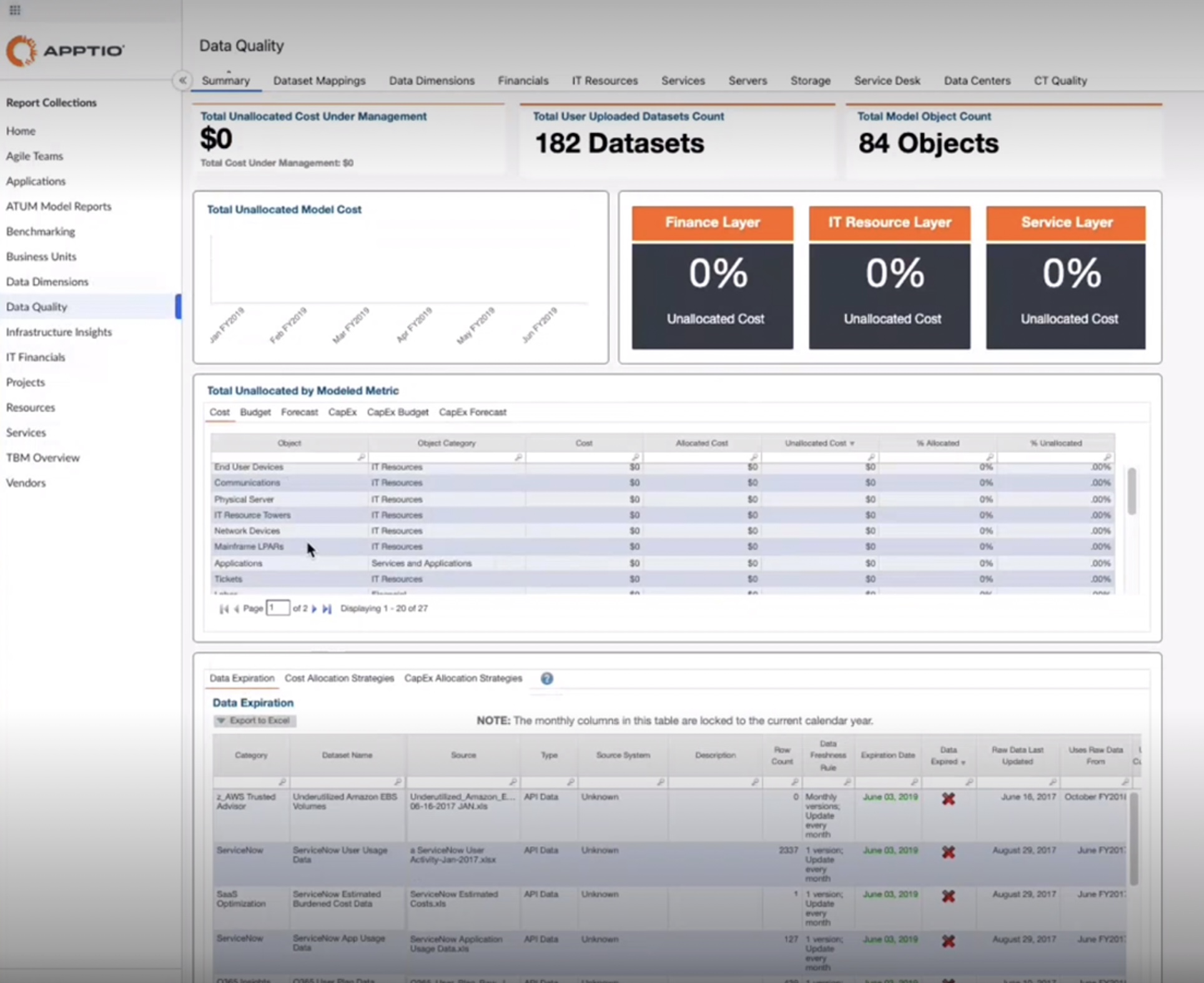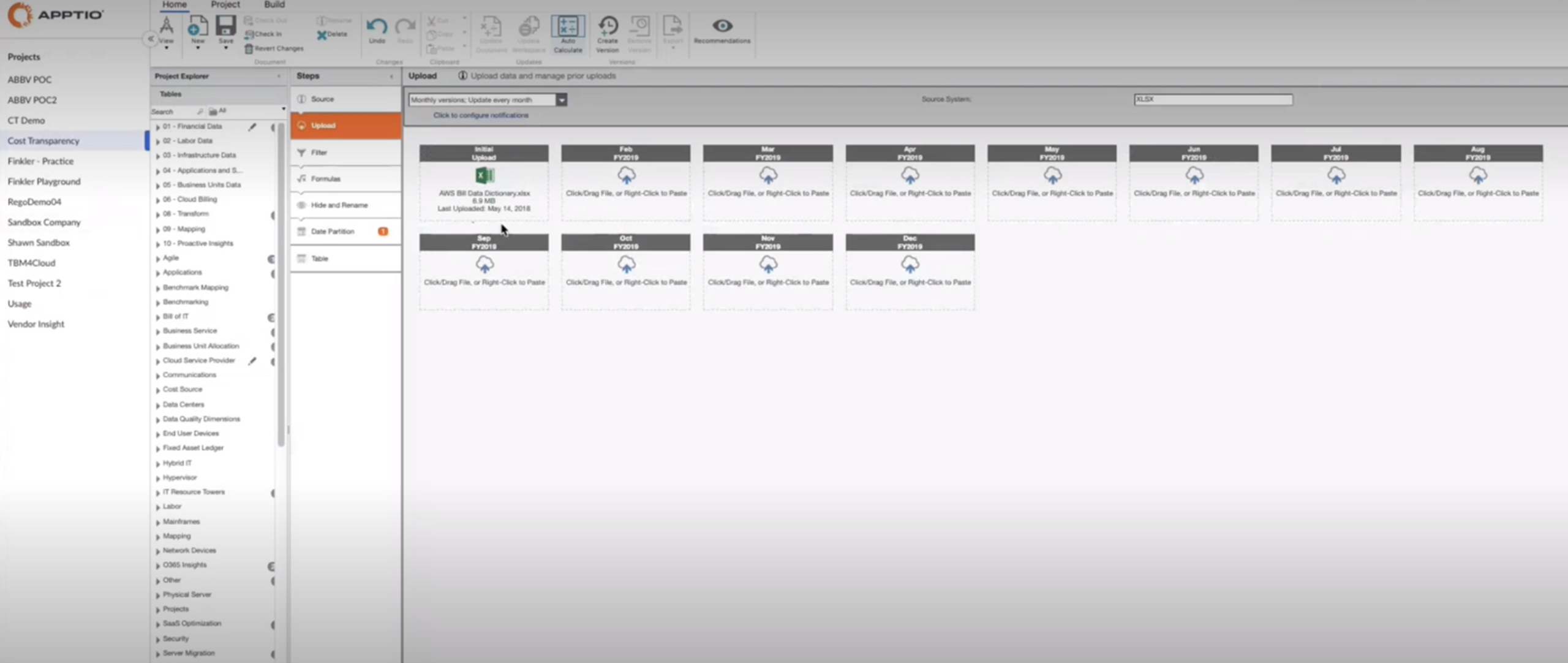Use Apptio’s Data Expiration tool along with mapping data connections between Apptio and other sources to manage your data’s “freshness.” Fresh or current data helps ensure leaders see current information to help them make more informed decisions.
What is Data Freshness and Expiration?
![]() Data freshness is simply a term used to describe how current a data set is, and determined by a set of defined parameters. For example, some forecast datasets may only be reviewed on a quarterly basis. So, if that file was uploaded the prior month, the data is considered accurate. Likewise, general ledger data that is loaded monthly is considered expired if it hasn’t been updated in two months.
Data freshness is simply a term used to describe how current a data set is, and determined by a set of defined parameters. For example, some forecast datasets may only be reviewed on a quarterly basis. So, if that file was uploaded the prior month, the data is considered accurate. Likewise, general ledger data that is loaded monthly is considered expired if it hasn’t been updated in two months.
Data expiration is when a set of data is no longer considered accurate. Policies dictate when a set of data is going to be transferred into Apptio. Expiration is when the data is determined to expire and archived (or cached). By keeping your data sets current, those reviewing the data are not inundated with a long list of expired data sets and are more likely to trust the data to be current and relevant.
Benefits of Managing Data Freshness
Accurate data ensures a level of trust and usefulness as leaders are using Apptio to make business decisions. This is necessary if your goal is to manage your IT spend and ensure your business is spending money on areas that drive value. This data governance practice helps you maintain the relevance of any data pulled from external source systems.

Trust in the Data
Current and applicable data sets create trusted and useful reports that leaders rely on to help them make sound business decisions. If data sets are dated, they may be considered irrelevant, causing leaders not to trust the overviews and reports they need to facilitate good decision-making. In fact, many, if they see a long list of dated data sets, may back out immediately and consider the imported data managed by Apptio useless.
Increased Use of Apptio
When data is accurate, Apptio will be used more as a trusted business tool. And if your team is taking an iterative approach to rolling out Apptio modules, successful adoption can lead to further use cases. That will lead to greater ROI on your Apptio investment.
Data Governance Best Practices
When loading data into Apptio, there are a few simple rules that will help populate the Data Expiration report and ensure smoother month end data loading processes:
- Make sure each dataset is assigned to the correct category.
- Make sure to assign the correct Data Freshness Rule for each table.
- Make sure you assign the correct source system for the data set.
- Whenever possible, automate the upload with Datalink.

Apptio can help you set up your Data Expiration Rules by offering you a range of choices, such as “Update Every Month” or “Update at the Start of the Year.” Upload times are managed during the “Upload” phase. Apptio supports the option to set it up “as needed” if required rather than yearly or monthly.
Let Rego Be Your Guide
How Rego Can Help
Setting up data freshness rules, data connectors, and data expirations policies can be complicated, especially if you are already tasked with managing large volumes of data and have been building your Apptio model for a few years. We are here to help.
Rego Apptio experts can help you,
- Identify helpful datalink connectors
- Define desired results
- Create data governance plans
- Build smart data freshness and expirations policies
- Implement best practices
- Improve reporting, views, and dashboards
- Increase adoption and use of Apptio
- Clean up data sets and remove technical debt from previous implementations
- Identify helpful future implementations or processes
- Train leading Apptio users
Rego Consulting provides most of our connectors for free. This includes Apptio connectors. We also offer Apptio support services, which include help with connectors and integrations, managed support, configuration support, and training. Contact your Rego consultant or us directly if you want to discuss how we can help you manage your data freshness and data expiration policies using Apptio.










